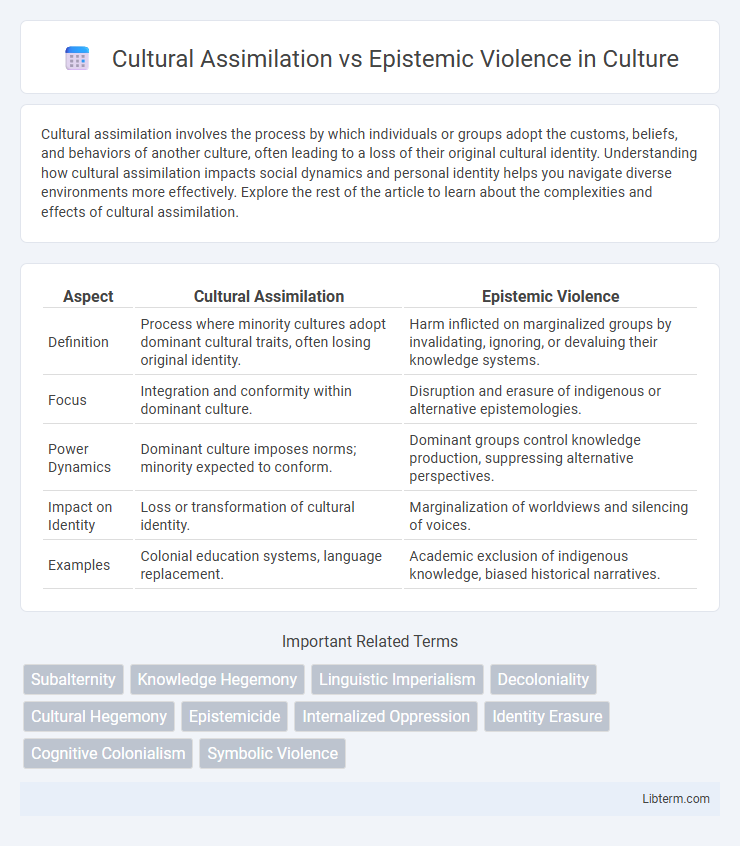Cultural assimilation involves the process by which individuals or groups adopt the customs, beliefs, and behaviors of another culture, often leading to a loss of their original cultural identity. Understanding how cultural assimilation impacts social dynamics and personal identity helps you navigate diverse environments more effectively. Explore the rest of the article to learn about the complexities and effects of cultural assimilation.
Table of Comparison
| Aspect | Cultural Assimilation | Epistemic Violence |
|---|---|---|
| Definition | Process where minority cultures adopt dominant cultural traits, often losing original identity. | Harm inflicted on marginalized groups by invalidating, ignoring, or devaluing their knowledge systems. |
| Focus | Integration and conformity within dominant culture. | Disruption and erasure of indigenous or alternative epistemologies. |
| Power Dynamics | Dominant culture imposes norms; minority expected to conform. | Dominant groups control knowledge production, suppressing alternative perspectives. |
| Impact on Identity | Loss or transformation of cultural identity. | Marginalization of worldviews and silencing of voices. |
| Examples | Colonial education systems, language replacement. | Academic exclusion of indigenous knowledge, biased historical narratives. |
Defining Cultural Assimilation: History and Key Concepts
Cultural assimilation refers to the process by which minority groups adopt the customs, values, and behaviors of a dominant culture, often leading to the erosion of original cultural identities. Historically, assimilation policies have been implemented through colonization, education systems, and legal frameworks aimed at integrating indigenous populations and immigrants into prevailing societal norms. Key concepts include acculturation, loss of language, identity transformation, and the power dynamics that enforce cultural conformity under the dominance of a hegemonic group.
Understanding Epistemic Violence: Origins and Impact
Epistemic violence originates from the systematic marginalization and invalidation of non-dominant knowledge systems, often occurring through cultural assimilation policies that prioritize hegemonic worldviews. This process erodes indigenous epistemologies by denying their legitimacy, leading to social and cognitive injustices that affect identity and autonomy. Understanding epistemic violence reveals how institutional power structures perpetuate knowledge hierarchies, reinforcing cultural dominance and silencing diverse perspectives.
The Interplay Between Culture and Knowledge
Cultural assimilation often imposes dominant knowledge systems, overshadowing indigenous epistemologies and perpetuating epistemic violence by invalidating alternative worldviews. The interplay between culture and knowledge reveals how power dynamics shape whose knowledge is recognized, influencing identity and collective memory. Understanding this relationship challenges hegemonic narratives and supports the preservation of diverse cultural epistemes.
Mechanisms of Assimilation: Tools of Power
Mechanisms of assimilation operate as strategic tools of power, enforcing cultural homogeneity by suppressing marginalized identities through education systems, language policies, and media control. Institutional frameworks employ epistemic violence by invalidating indigenous knowledge systems and privileging dominant cultural narratives, systematically eroding alternative worldviews. These processes perpetuate power imbalances, reinforcing hegemonic ideologies while silencing diverse epistemologies.
Epistemic Violence in Educational Institutions
Epistemic violence in educational institutions manifests through the systematic devaluation and exclusion of marginalized knowledge systems, reinforcing dominant cultural narratives that shape curricula and pedagogy. This form of violence perpetuates inequities by invalidating the lived experiences and epistemologies of Indigenous, racialized, and other minority students, often rendering their perspectives invisible or inferior. Addressing epistemic violence requires transformative curriculum reforms that integrate diverse epistemologies and foster critical awareness of power dynamics embedded in knowledge production.
The Role of Language in Enforcing Dominance
Language functions as a primary tool in cultural assimilation by imposing dominant linguistic norms that marginalize minority languages, effectively silencing alternative worldviews. This linguistic dominance enforces epistemic violence by invalidating non-dominant knowledge systems and perpetuating power asymmetries within social hierarchies. The suppression of indigenous languages through institutional policies exemplifies how language enforces cultural hegemony and restricts epistemic diversity.
Identity, Resistance, and the Politics of Belonging
Cultural assimilation pressures marginalized groups to conform, often erasing unique identities and perpetuating epistemic violence by invalidating indigenous knowledge systems. Resistance emerges as a powerful assertion of identity, challenging dominant narratives and reclaiming political agency in spaces where belonging is contested. These dynamics shape the politics of belonging by highlighting how identity preservation and epistemic justice are integral to social inclusion and equity.
Case Studies: Assimilation and Epistemic Erasure
Case studies of cultural assimilation reveal systematic processes where dominant groups impose their values, languages, and knowledge systems, leading to epistemic violence that erases marginalized epistemologies. For example, Indigenous educational policies forcibly replaced native languages with colonial languages, effectively silencing traditional knowledge and cultural identities. Such assimilation not only disrupts cultural continuity but also perpetuates knowledge hierarchies that delegitimize non-dominant worldviews.
Decolonizing Knowledge: Pathways to Epistemic Justice
Cultural assimilation often erases indigenous knowledge systems, perpetuating epistemic violence by invalidating non-Western ways of knowing. Decolonizing knowledge requires reclaiming and valuing diverse epistemologies to achieve epistemic justice and dismantle colonial power structures. Pathways include integrating marginalized voices in academic discourse and promoting pluriversality in knowledge production.
Reimagining Coexistence: Toward Pluralist Futures
Cultural assimilation often enforces dominant norms, erasing diverse identities and perpetuating epistemic violence by invalidating marginalized knowledge systems. Reimagining coexistence requires embracing pluralist futures where multiple epistemologies coexist equitably, fostering mutual respect and intercultural dialogue. This approach challenges hierarchical knowledge structures and promotes inclusive, decolonized frameworks for shared social and cultural development.
Cultural Assimilation Infographic

 libterm.com
libterm.com